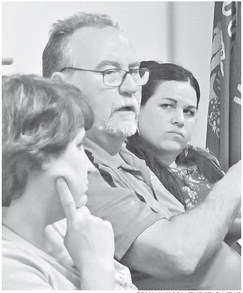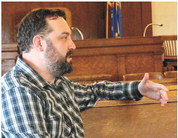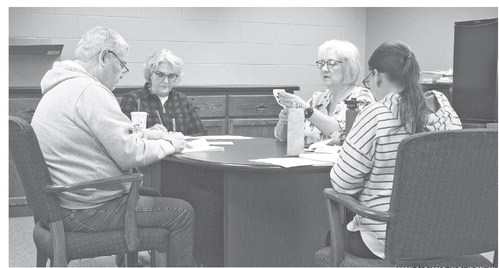County sets stage for overhaul of vacation, sick leave policies


Taylor County’s leave policies are generally in line with those offered by other public and private sector employers around the state and nation.
At Friday’s meeting of the Taylor County Finance and Personnel committee, the committee members heard from Eric Twerberg a representative of USI Insurance Services who presented a comparison chart of leave benefits with the county and other employers.
Leave benefits traditionally include vacation, sick leave and personal days, in recent years a growing trend among employers is to lump all these into paid time off (PTO) hours that can be used however the employees choose. The consultant explained that every year his firm benchmarks clients across the country for their paid leave benefits. It was noted that prospective employees routinely look at salaries first and then at vacation time when looking to go to a new job.
Public sector, government, jobs have been slower to adopt PTO policies compared to the private sector.
“I am in full support of a PTO plan,” said committee member Lynn Rosemeyer. She noted that in her experience employees are more likely to treat sick days as vacation days than they are to use PTO time for it because of knowing they need to keep some in case the employee does get sick.
“I think it is a win, win for the employees and the county,” she said.
Human Services Director Suzanne Stanfley said she has worked in both environments and said she thinks the PTO system is “a lot cleaner” describing the existing system as being cumbersome and very confusing. However she cautioned about the need to look at it closely and address issues such as what they should do with accrued sick time balances.
“It has to be thought out,” Stanfley said. She said that while she thinks the PTO is a great model, she said it needed a good structure and assurance that they would not be taking benefits away from employees. She asked if the county could afford to pay out the sick time balances in one lump sum and how they are going to get there without taking more benefits away.
“No employer wants to take away from employees,” said Twerberg.
Further complicating things in Taylor County is that the county has two different vacation schedules, one for employees hired prior to 2013 and one for employees since then. Committee member Scott Mildbrand noted that USI would be able to help the county come up with a plan that would be fair for everybody.
Airport coordinator
Taylor County inched forward on a plan for current airport manager Fred Ebert to drop to a casual position in early 2024 setting the county up for an airport management structure similar to those in place at other smaller airports.
The plan calls for Ebert to get a pay bump, but to drop to working about 1,000 hours a year from his current full time position. He said that with that time and the use of part-time workers they could continue to operate the airport at its current level.
The suggestion was initially raised during the budget review sessions as a way to potentially save the county about $50,000 a year. Airport traffic has not rebounded since the Covid-19 pandemic. The proposal has the support of the county’s airport committee.
Mildbrand, who was running the meeting in the absence of normal committee chairman Chuck Zenner, said he was hesitant to have the committee approve the change without it going to the full county board.
It was noted, any change in the authorized positions for the airport would need to be approved by the county board. Ebert explained he was looking for a decision to be made so that he could complete the airport budget with the accurate information.
“We have to be cognizant to do things exactly correct,” Mildbrand said.
There was also some confusion among committee members about when the change would go into effect with some thinking it would be immediate, while Ebert pushed for it to take place in January or early February.
“I would like wage to go into effect next pay period, but there are a lot of hoops to jump through,” Ebert said.
“In a business setting this would be a slam dunk, but we are not working in that system,” Ebert said, noting government moves more slowly. He also said he didn’t want to box himself into a corner with having to make the change before things were ready.
Ebert noted there would be no change in the job description other than with the change in the hours he would be working. He gave the example of the Merrill Airport as being one where a similar model is employed with the manager there also running private business at the airport.
Human Resources Director Nicole Hager explained that the change has been discussed at two airport committee meetings.
The measure was approved to go to the full county board for action in October.
Health inspector changes
Taylor County is taking steps to have its health inspector be a county employee rather than an independent contractor.
County health director Michelle Cahoon explained that since 1989, the county has contracted for the inspector position. She said in a review of budgets and finances for the department, she felt it would make more sense, and potentially save the county money to make the position a full-time staff members of the health department with the title of Health Specialist/Sanitarian.
“It makes more sense to have it as a county position,” she said, asking for it to be set at 35 hours per week. This change would bring the health department’s authorization up to eight full time staff, but as she noted, it would not change the actual number of people working within the department because the inspection work would be done by the newly created position.
In addition to approving a job description, committee members also approved the Carlson Dettmann wage recommendation placing it at a class J which is the professional level with the job requiring a bachelor’s degree. The starting pay for that classification is $26.79 per hour with a control point of $31.52 per hour.
The position will continue to be funded through the collection of licensing fees on businesses and individuals where the inspections have to take place. Cahoon said the current license fees would be able to sustain the position even to the control point level.
In other business, committee members:
Approved updated job descriptions for the county treasurer, county clerk and register of deeds. The current job descriptions were last updated in 1995.
Approved a request to increase the chief deputy in the register of deeds office from 35 to 40 hours per week. According to Register of Deeds Jaymie Kohn, the office had a part-time staff member leave and rather than fill that position she believes they can add hours to the deputy and be a net savings to the county. She estimated the savings at about $13,000 over having the part-time staff member.
Approved the job description for a Conservation Assistant in the Land Conservation Department. The employee in that position left for a new job and the county took the opportunity to update the job description before it is filled.
Approved the job description for the Chief Deputy County Clerk in the County Clerk Department. County Clerk Andria Farrand noted her office does not currently have a chief deputy, unlike other county offices and that it is her intention to create the position and promote an existing staff member into it.
Approved authorizing the human services department to begin allowing clients to use debit or credit cards to pay for services. The fees are charged back to the card users with no cost incurred by the county. A number of county departments already allow use of debit and credit cards with different vendors with the question raised about if it would be beneficial for the county to switch to a single vendor for this service.
Approved following a brief closed session, authorizing five additional vacation days for the newly hired assistant forest administrator. Mildbrand noted that in the past these sorts of decisions have been done in both closed and open session. He said he spoke with the county’s attorney and that she recommended they be held in open session. Soper agreed and suggested the county should discuss matters such as this in open session unless the individual is passionate about it being in closed session.




